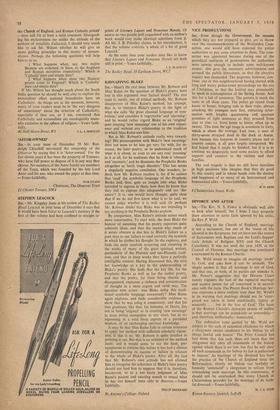KIDNAPPING BLAKE SIR,—Hasn't the real issue between Mr. Robson and
Miss Raine on the question of Blake's poetry been lost in this argument over factual detail? The real issue is, surely, one of critical methods. Mr. Robson disapproves of Miss Raine's method, her attempt, that is, to interpret Blake's poetry in the light of what she calls 'the great classical language of sym- bolism,' and considers it 'regrettable' and 'alarming'; and he would rather regard Blake as an 'original' poet creating 'new meanings' out of his own experi- ence and without any relationship to the tradition in which Miss Raine sees him.
But is Mr. Robson's attitude really very reward- ing? His preoccupation with Blake's 'new meanings' does not seem to let him get very far with, for in- stance, the later poetry, or to understand much of what it is about, or even to see any real 'meaning' in it at all, for he confesses that he finds it `obscure' and 'eccentric,' and he dismisses the Prophetic Books altogether as 'lurid, tragic disasters.' This last seems a singularly negative conclusion. One wonders, in- deed, how Mr. Robson reaches it, for if he cannot first 'read' the symbolic language of the Prophetic Books and, thus, gain an insight into what Blake intended to express in them, how does he know that they fail to express this adequately and are 'dis- asters'? It is, one would have thought, quite clear that if we do not first know what is to be said, we cannot judge whether it is well said. Or perhaps Mr. Robson thinks that Blake was not intending to say anything in the Prophetic Books anyhow.
By comparison, Miss Raine's attitude seems much more constructive. To start with, she does Blake the honour of assuming that his poetry expresses quite coherent ideas, and that the reason why much of it seems obscure is due less to Blake's failure as a poet than to our failure to read correctly the symbols in which he clothes his thought. So she explores, and finds the same symbols occurring and recurring in the works of many of the great spiritual writers, particularly of the Platonic and neo-Platonic tradi- tion, and that in these works they have a perfectly intelligible content. Having discovered this, she tries her knowledge as a key to the understanding of Blake's poetry. She finds that the key fits, for the Prophetic Books as well as for the earlier poetry, and that the poetry, far from being chaotic and disorganised, expresses a richness and concentration of thought in a most cogent and vivid way, The question now arises : was Blake using this tradi- tional symbolic language consciously? Miss Raine again explores, and finds considerable evidence to show that he was using it consciously, and that his true greatness, like that, for instance, of Dante, lies not in being 'original' or in creating 'new meanings' (a most trivial occupation in any case), but in re- expressing in a vital form aspects of a perennial wisdom, of an unchanging spiritual knowledge.
It may be that Miss Raine fails in certain instances to apply her method with sufficient scholarly rigour, and, if this is so, Mr. Robson is quite justified in pointing it out. But that is no criticism of the method itself; and it would seem, to say the least, pre- sumptuous to criticise this before it has had a chance of demonstrating its success or failure in relation to the whole of Blake's poetry. After all, the fact that Mr. Robson's own attitude has not allowed him to recognise the coherence of Blake's later poetry should not lead him to suppose that it is, therefore, incoherent, or to a too hasty judgment of Miss Raine's patient and exacting search to reveal what he has not himself been able to discover.—Yours faithfully,
St. Antony's College, Oxford
PHILIP SHERRARD










































 Previous page
Previous page